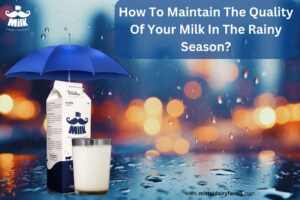How To Maintain The Quality Of Your Milk In The Rainy Season?
With the onset of monsoons, hygiene, milk quality, and growing microbes are the major concerns of every dairy consumer – and rightly so! No one wants to put themselves or more importantly, their families at risk, especially in a time like the one we’re living in! With the ongoing pandemic, we strive to make every attempt to ensure that we put our families at minimum risk of any health issue.
Being one of the most notable dairy farms in town, we want to take you through some simple ways to keep your milk fresh longer during this season and avoid the possibility of bacteria.

Let’s understand how monsoons impact Desi Cow Milk quality.
You might have noticed that your desi cow milk seems to be of a slightly more watery consistency during the rainy season and tends to spoil sooner if kept outside the refrigerator. Though the milk production and packaging remain the same at the farm, the difference is with the fodder. As our cows graze on the fresh green grass of the season, the water content in milk tends to increase. However, the nutrient value remains the same.
Your A2 milk or Gir cow milk retains all its vitamins, minerals and essential fats, with the same taste and aroma, making it perfectly safe to consume desi cow milk from fresh dairy farms even during the rainy seasons.
Moreover, we would like to share a few steps that you can use to ensure its longer shelf life.
● If you are habitual of using thicker milk, consume the milk only after boiling it to remove the additional natural water from milk during this season.
● Try consuming your raw A2 milk within a day during monsoons or, if leftover, boil it up to store for the next day. With a humid climate, keeping any food item sitting longer increases the risk of breeding microorganisms.
● It is advisable to boil milk, if not kept at a temp below 37°C at all times, as monsoons provide a favourable environment for the growth of many microbes.
● Boiling milk once every few hours has been an age-old tradition in our households to keep milk fresh longer (for when refrigeration is not available).
● You can make curd or yoghurt from your leftovers of the day to avoid the risk of milk spoiling. Curd and other milk products have longer shelf life than raw milk and provide an easy way to escape spoiled milk yet gain pure desi cow milk nutrients.
● Maintain general hygiene, especially in your kitchen and fridge area. It is best to keep the area dry. More so, during monsoons, you can avoid the chances of bacterial contamination.
If you still have any concerns regarding your dairy farm or A2 milk, or Gir cow milk for this rainy season, please reach out. Our team would be happy to help.
